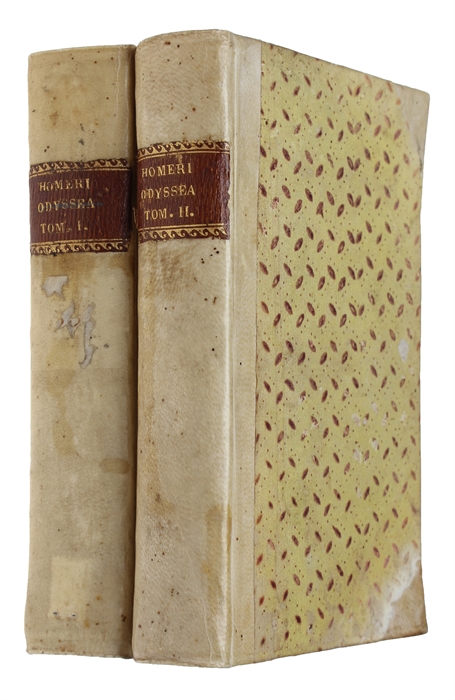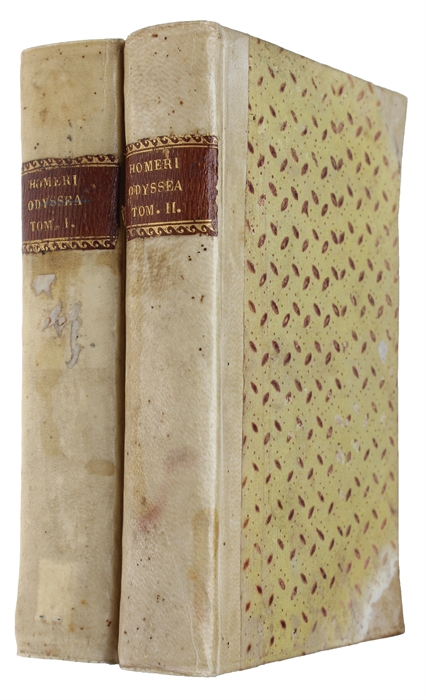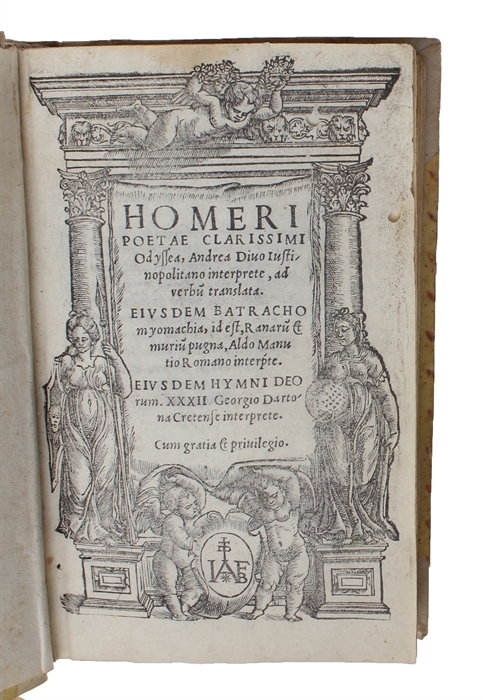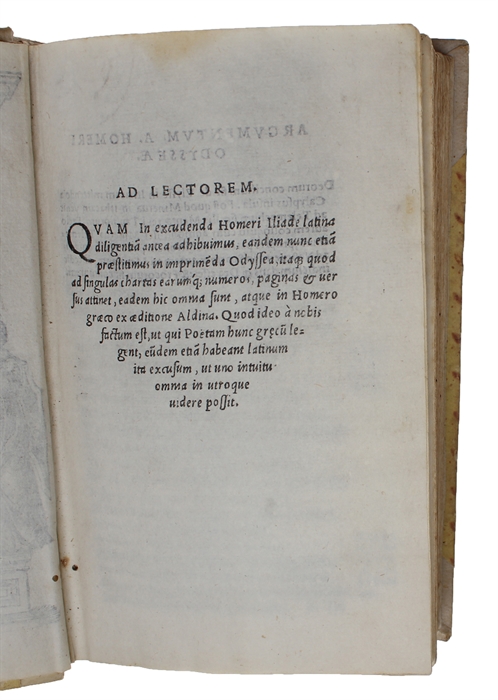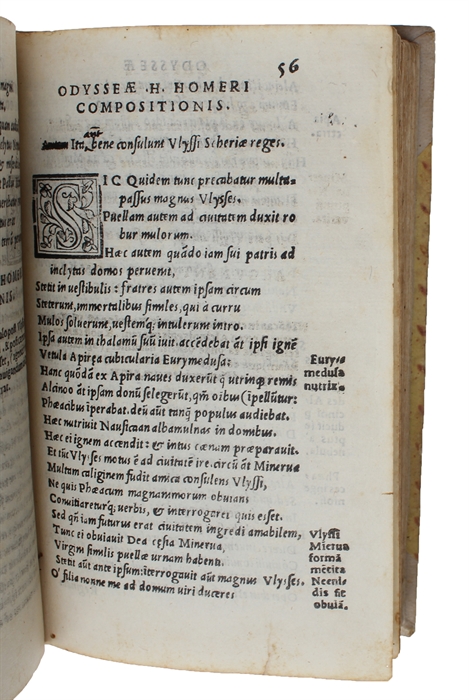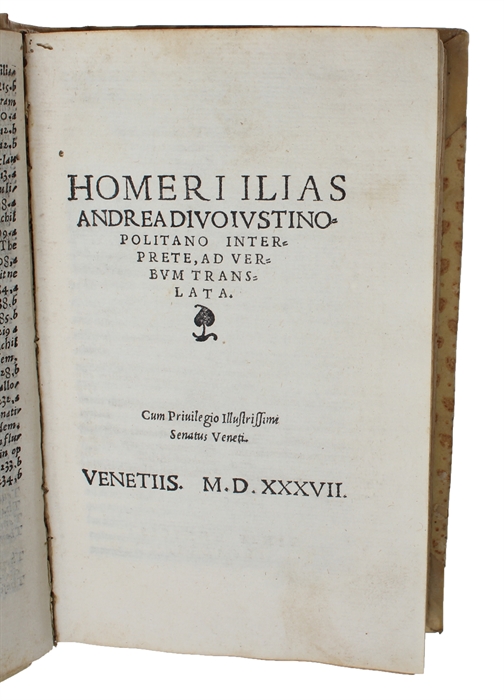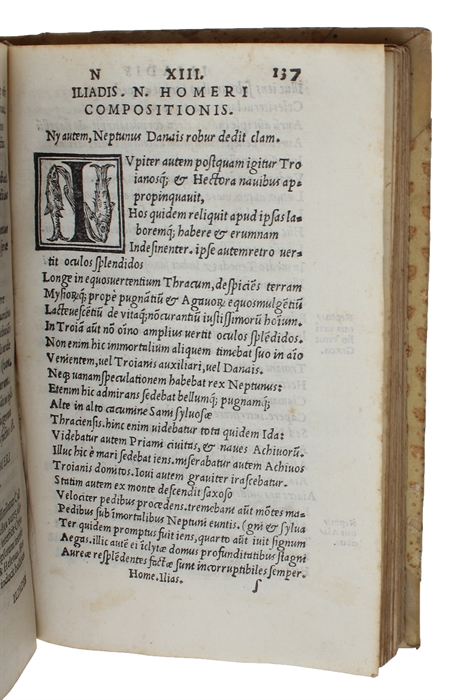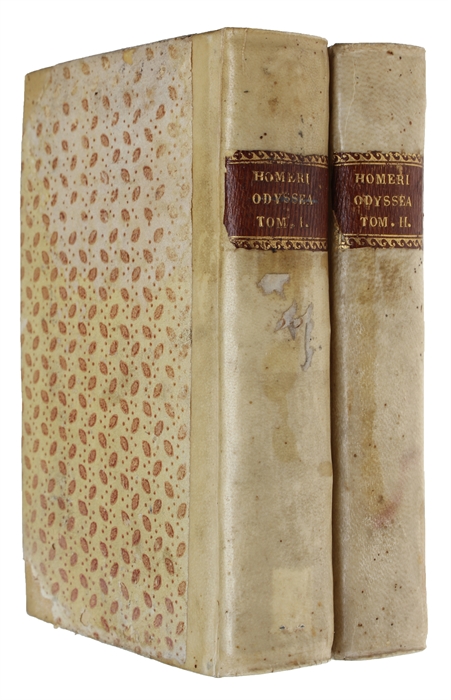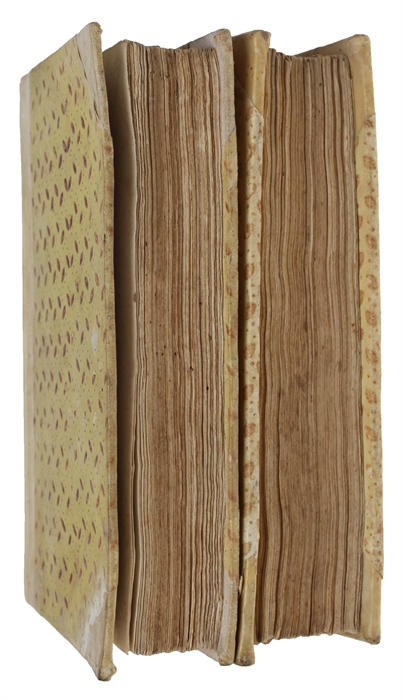THE EXTREMELY INFLUENTIAL "VERSIO LATINA"
HOMER. - DIVUS transl. & ALDUS MANUTIUS & GEORGIUS DARTONA.
Poetarum Omnium. Ilias & Odyssea. 2 vols. I. Ilias, Andrea Divo justinopolitano interprete, ad verbum translata. Herodoti Halicarnassei libellus, Homeri vitam fidelissime continens, Conrado Heresbachio interprete. cum Indice copiosissimo. Cum Gratia & Privilegio. II. Odyssea Andrea Divo justinopolitano interprete, ad verbum translata. Eiusdem Batrachomyomachia, id est, Ranarum et murium pugna, Aldo Manutio Romano interprete. Eiusdem Hymni deorum XXXII. Georgio Dartona Cretense interprete. Cum Gratia & Privilegio.
Venice, Jacobus à Burgifrancho, 1537.
8vo. Bound in two nice later (18th century) half vellum bindings with gilt leather title-labels to spine. Lovely 18th century patterned paper over boards. a bit of overall wear, but generally very nice. Internally very nice and clean, with only very light occasional dampstaining. Small wormholes to blank margins, some neatly restored. Overall a very nice, clean, and fresh set indeed. Fully complete (possibly with the exception of blanks in the Odyssey).
Iliad: (22), 277, (1, colophon) ff. + two blank leaves. Title within woodcut ornamental border, woodcut initials, large woodcut printer's device to verso of colophon-leaf.
Odyssey: 251, (8, -index), (1, -colophon) ff. Title within woodcut ornamental border, woodcut initials, large woodcut printer's device to verso of colophon-leaf. The 8-leaf index has been misbound and is placed between ff. 184 and 185.
Scarce first printing of the first Divo-editions of The Iliad and The Odyssey, the first printed official "Versio Latina" of Homer, being the first complete Latin text of the Iliad and Odyssey available in print and one of the most influential versions of these two masterpieces ever to appear. While several other versions of the Iliad and the Odyssey had appeared earlier, Divo's Latin translation of both works together, with life of Homer by Herodotus in Latin version by Konrad Heresbach, and with the Batrachomyomachia and Homeric hymns in Latin versions by Aldus Manutius and Georgius Dartona, came to greatly dominate Homeric reading in the 16th century and became one of the very most influential versions of the Homeric corpus ever to appear. "The first half of the sixteenth century witnessed an explosion of Homeric texts in print, including the influential Hervagius editions by Joachim Camerarius and Jacobus Micyllus (Basel, 1535 and 1541) and four Strasbourg editions (by Johannes Lonitzer and Wolfgang Capito) between 1525 and 1550 alone. But it was the production of Latin, as well as bilingual Greek-Latin, editions during this period that helped to broaden familiarity with Homer among learned humanists and lay readers alike. [...) Sebastian Castellio' s 1561 Greek-Latin edition of Homer was clearly intended for educational purposes, as were Crispinus' s editions (Geneva, 1560 ? 1567), which advertise on their title pages that they contain a " literal Latin version set against [the Greek]" (Latina versione ad verbum e regione apposita). Yet it was another ad verbum Latin translation of the Iliad and Odyssey, by Andreas Divus, that came to dominate during the sixteenth century. First printed in two Venice editions of 1537, one by Melchior Sessa and the other by Jacobo Burgofranco, both with a preface by Divus' s fellow Capodistrian humanist Pier Paolo Vergerio, this Latin crib was later reprinted by the jurist Obertus Giphanius (Hubert van Giffen, 1534 ? 1604) and then used (via Crispinus' s 1570 Geneva edition) as the foundation for Johannes Spondanus' s (Sponde, Jean de, 1557 ? 1595) Latin text in his 1583 Homeri Quae Extant Omnia, a bilingual edition with extensive commentary whose Greek text was the 1572 Strasbourg edition of Giphanius (Sowerby 1996). Although Divus' s translation was the first complete Latin text of the Iliad and Odyssey available in print, its originality has been questioned, given the many close parallels it shares with the much earlier translation by Leontius Pilatus (d. 1366), a translation produced at Boccaccio' s request and subsequently sent to Petrarch." (Pache, edt.: The Cambridge Guide to Homer, 2020, p. 495). Each volume is scarce in itself, but it is extremely rare to find both volumes together and fully complete. Adams H770 Hoffmann II: 333 Graesse III:332
"The Versio Latina, or Latin translation of the works of Homer, has existed since the 14th century, but was first printed, under the name of Andreas Divus, in 1537. It is a crib, to give it no finer name, but a crib which had immense influence, being the first introduction to Homer for generations of mediaeval and early modern scholars." (Introduction by Hefyd to the Libri Vox-version of Book 6 of the Odyssey).
This came to be the standard Latin version of Homer for centuries to come. It was this version of the texts that Chapman for his translation into English in 1598, and it was used directly by Ezra Pound in his long poem "The Cantos" more than three centuries later.
Order-nr.: 59799

